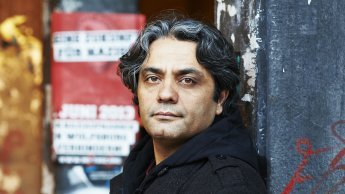
November 29 2013
In September, filmmaker Mohammad Rasoulof returned to Iran. Now he’s forbidden to leave again.
Ironically, this happens just as his latest film is making a splash on the international festival circuit.
Rasoulof was not permitted to leave Iran to present his latest film, “Manuscripts Don’t Burn,” at its Paris screening November 11.
The film, which sharply criticizes the violence in Iran under President Ahmadi-nejad, premiered at Cannes in May.
After that festival, Rasoulof stayed in France. When he traveled to Iran in September, he expected to remain only five days. But he has been there for two months now, strictly monitored and forbidden from leaving the country.
Like many Iranian intellectuals and artists, Rasoulof hoped that Rohani’s election would translate into greater freedom of speech and a decisive break with the Ahmadi-nejad era. But change is not yet apparent to Rasoulof.
Arrested in 2010 along with another fellow filmmaker Jafar Panahi, Rasoulof was initially handed a six-year prison sentence for “propaganda against the Islamic Republic” and “plotting against national security.” That decision was appealed and the sentence reduced to one year, though Rasoulof has not yet been sent to prison to serve that time.
Iran’s treatment of its intellectuals, especially its filmmakers, has often seemed contradictory. In 2010, apparently eager to improve the country’s image on the international stage, the Culture Ministry sent Rasoulof to Cannes to present his film “Goodbye” – despite knowing that the writer/director had changed the film after the script had gotten past the censors.
As he prepared for that trip to France, the authorities confiscated all of Rasoulof’s prior footage, presumably as collateral to ensure he would return from France. But the director was ultimately unable to leave Iran, because his French visa did not arrive in time.
France 24, the French government’s international satellite news channel, broadcasting in French, English and Arabic, contacted Rasoulof’s supporters to ask why the filmmaker returned to Iran in September. They said Rasoulof did not want to fight for democracy from exile. Rather, the director has said he prefers to pursue his analysis of Iranian society by making movies inside Iran.
Risk-taking has always been a part of Rasoulof’s work, France 24 commented. His latest, “Manuscripts Don’t Burn,” was shot on the sly during the Ahmadi-nejad era using a hidden camera. Two of the film’s actors, who lived in Iran at the time, were subsequently forced to leave.
Despite the strict surveillance he has been subject to over the past few months in Tehran, Rasoulof is reportedly at work on his next film, in which he will question the concept of identity and whether or not it is linked to nationality.
Rasoulof’s work has, if anything, become bolder in its criticism of Iran. “Manuscripts Don’t Burn” portrays an Iran plagued by censorship, persecution of intellectuals, summary executions and police harassing citizens.
The film won the international critics’ group (FIPRESCI) prize at Cannes in 2013 and was warmly received at its screening in Paris earlier this month.
